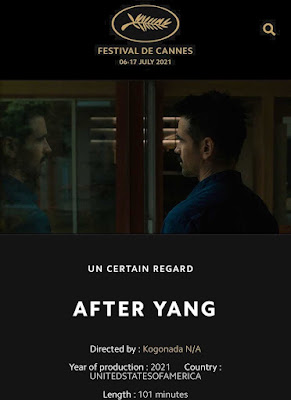Yang is a way more advanced AI than Alexa. When you ask him to turn off a light, he does it. In fact, he is truly a part of Jake and Kyra’s family, so when he goes on the fritz, it is very distressing for them—and especially so for their young adopted daughter Mika. They will have to prepare her to experience grief for the first time, while learning there was more to their “techno-sapien” “son” than they realized in Kogonada’s After Yang, which premiered (online) as part of this year’s Sundance Film Festival.
When Kyra and Jake adopted Mika from China, so they also purchased Yang, a life-like AI-cyborg to serve as her big brother and help keep her connected to her Chinese culture. However, they bought him certified-refurbished from a licensed re-seller that apparently is no longer in business. Unfortunately, that means when he breaks down, he most likely can’t be repaired.
Suddenly, the two parents realize how much they had delegated their parenting responsibilities to Yang. They also must come to terms with their own sense of loss. However, the discovery of a cache of Yang’s saved memories leads Jake to the discovery of Yang’s secret relationship with a clone and his previous lives with other families, before they acquired him.
After Yang is a sensitive, character-driven science fiction story, in the tradition of films like Marjorie Prime that happily does not involve terminally ill people cloning themselves (as in Swan Song and half a dozen films before it). Kogonada’s adaptation of an Alexander Weinstein short story still has clones and it very definitely challenges viewers to reconsider what it means to be human. This near future world features humanity living and working together with its sentient creations in reasonable harmony, but the way people relate to AIs and clones is clearly still developing.
Kogonada de-emphasizes the flashy futuristic trappings, focusing instead on big ideas and big emotions (although self-driving cars are already a staple of the world). Indeed, the way he and actor Justin H. Min tease out intriguing new dimensions to Yang’s character is one of the most successful aspects of the film.
Min is terrific as Yang—a tricky role, because the AI is by nature calmly even-keeled. Colin Farrell is also quite impressive as Jake, who does indeed learn and grow quite dramatically over the course of the film, but not in a simplistic, moralistic way. Nevertheless, the true breakout star of After Yang is likely to be Malea Emma Tjandrawidjaja, who is remarkably charismatic and engaging as young Mika.
Kogonada and cinematographer Benjamin Loeb give the film an intimate but sophisticated look and vibe that aptly reflects the meditative aesthetics of the tea ceremonies that represent Jake and the Ozu films that inspired the director. The minimalist themes of Ryuichi Sakamoto suit its austerity to a tee. This is a thoughtful film that constantly unfolds in rewarding ways. Very highly recommended, After Yang screens online again tomorrow (1/23) during this year’s Sundance.

